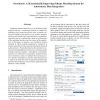Free Online Productivity Tools
i2Speak
i2Symbol
i2OCR
iTex2Img
iWeb2Print
iWeb2Shot
i2Type
iPdf2Split
iPdf2Merge
i2Bopomofo
i2Arabic
i2Style
i2Image
i2PDF
iLatex2Rtf
Sci2ools
116
click to vote
IRI
2009
IEEE
2009
IEEE
OntoMatch: A Monotonically Improving Schema Matching System for Autonomous Data Integration
Traditional schema matchers use a set of distinct simple matchers and use a composition function to combine the individual scores using an arbitrary order of matcher application leading to non-intuitive scores, produce improper matches, and wasteful and counterproductive computation, especially when no consideration is given to the properties of the individual matchers and the context of the application. In this paper, we propose a new method for schema matching in which wasteful computation is avoided by a prudent, and objective selection and ordering of a subset of useful matchers. This method thus has the potential to improve the matching efficiency and accuracy of many popular ontology generation engines. Such efficiency and quality assurance are imperative in autonomous systems because users rarely have a chance to validate the processing accuracy until the computation is complete. Experimental result to support the claim that such an approach monotonically improves the matchin...
Distinct Simple Matchers | Individual Matchers | Information Retrieval | IRI 2009 | Traditional Schema Matchers |
Related Content
| Added | 24 May 2010 |
| Updated | 24 May 2010 |
| Type | Conference |
| Year | 2009 |
| Where | IRI |
| Authors | Anupam Bhattacharjee, Hasan M. Jamil |
Comments (0)

